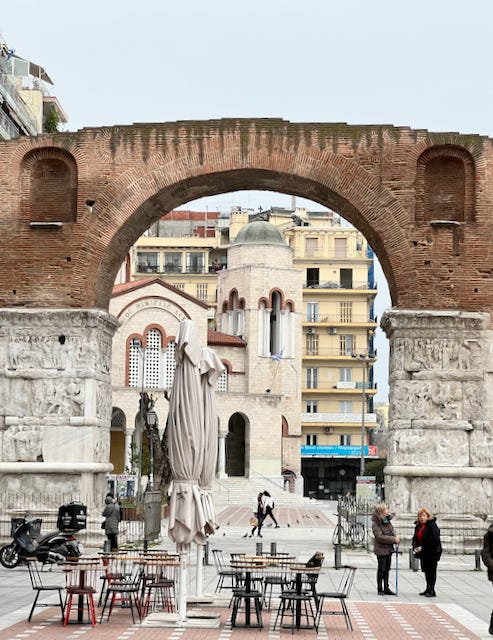Carnival in Thessaloniki - Faith, Food, and Flying Kites
Our Lenten experience in Greece
Zigzag Along is a free newsletter. If you love reading and want access to The Pilgrim Chronicles and other extra essays consider becoming a paid subscriber. If you just want to support us but commitment gives you hives, you can make a one-time donation here.
Hey, everyone! Yesterday was Palm Sunday for our Western Christian friends. Hosanna!
Eastern Orthodox and Western Christianity’s Easter calendars are as far apart this year as they can ever be. For Jeff and me, today is only the second Monday of Lent. Easter is still 42 days away for us! But in 2025, we will all celebrate on the same day: April 20th! Woohoo!!
This is a very different Lent season for me. I have only been Orthodox for a few years, so the practices are still fresh. I began converting during the pandemic, so my first Lent was spent at home. The world was still wearing masks during my second Lent. And then last year, I was in Greece!
Thessaloniki, Greece was added to our 2022-2023 European tour in the very early days of our planning. We hadn’t yet decided on Cyprus or Bulgaria. But we knew we were going to Thessaloniki!
We prioritized this city for a few reasons.
First, we were on a pilgrimage and wanted to see cities we grew up hearing about in the Bible. St. Paul traveled to Thessaloniki during his second missionary trip, around 50 AD, and wrote two letters to the church he started there.
Second, Thessaloniki is known as the "City of Saints;" filled with more ancient churches than you can imagine. Most of them are so old, they are designated UNESCO World Heritage Sites.
Most importantly though, we wanted to immerse ourselves in Greek culture during the time of Orthodox Great Lent; a season of fasting that begins on Meatfare Sunday(farewell, meat👋🏼), and extends through Holy Week and Pascha (the Orthodox word for Easter.)
And are we ever so grateful that we did!
If you aren't familiar with Orthodox Great Lent, let me give you a brief description of what it is.
Great Lent is the 40-day period in preparation for the feast of the Resurrection of Christ. During this time, people focus more on strengthening their spiritual character and practice this through increased prayer, fasting, and almsgiving (giving to the poor.) Fasting from meat, fish, dairy, eggs, wine, and oil is the common practice. So essentially, the diet is vegan.
There are special Church services that focus on specific Saints and disciplines to help encourage members in their faith and spiritual life through this time. And yes, the fast does last the entire 40 days, plus Holy Week, and ends after the midnight service celebrating Pascha. So, more like 50 days total.
Since most of Greece is Orthodox, it is super easy to find foods that follow the fasting guidelines, including in restaurants, bakeries, and even gelato shops. Woohoo!

There is an intriguing difference in the mood between Greece and America around the season of Lent.
Once again, due to the culture and beliefs, Greece has many holidays focused on their Orthodox faith. Instead of Mardi Gras, they observe what's called Carnival. It lasts for 2 weeks beginning with "Meat Fare" BBQs, where they say "farewell" to meat.
Young adults and children dress up in costumes similar to American Halloween, minus anything scary. Families are out together and the children walk around asking for treats. It's a very fun environment, filled with lots of music.
The culmination of preparations for the Fast happens on the actual first day. This is called "Clean Monday". It is a National holiday. Once again, with a focus on family time together. In Thessaloniki, many families go out to open areas like parks and fly kites together, hike, or visit their local zoo.
It definitely felt more like a celebration than the feeling of drudgery that comes across in America. It was a wonderful change of focus to begin our journey to Pascha.
Stick around as we share more stories of our time learning about this beautiful, ancient city. And now, enjoy this cute picture of us waiting to catch our bus.





